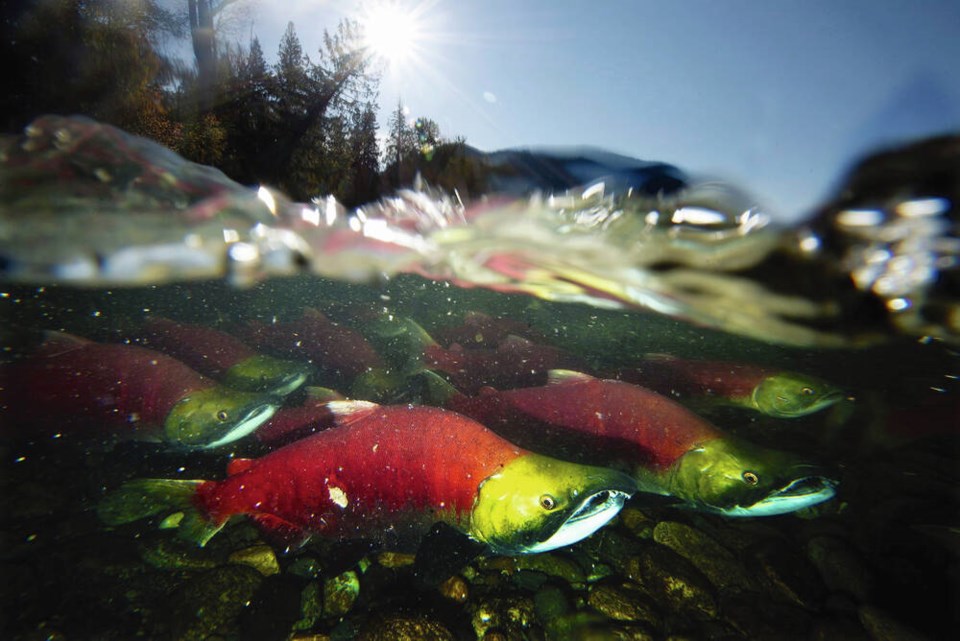March 1 marked the official start of the salmon out-migration period in Fisheries and Oceans sa���ʴ�ý’s calendar. It’s when millions of juvenile salmon embark on their arduous journey from the estuaries and bays along the Pacific coast out to sea.
This year, it marked the first time in decades that one of the most important salmon migration routes in the world, between mainland sa���ʴ�ý and Vancouver Island through the Discovery Islands and Broughton Archipelago, is mostly free of the spectre of parasites and disease from open net-pen fish farms.
If salmon are the lifeblood of so many First Nations, communities and ecosystems in sa���ʴ�ý, one of the main arteries has finally been unclogged.
This is thanks to the long struggle by First Nations in the Broughton and their supporters to remove open net-pens from their territories and the critical decision by then Fisheries Minister Bernadette Jordan to phase out salmon farming in the Discovery Islands by June 2022.
However, just two months before that deadline, this hard-fought victory for wild salmon in sa���ʴ�ý is in jeopardy. On April 22, a federal court judge set aside Jordan’s decision on procedural grounds, reopening that particular battle in the fight for wild Pacific salmon survival.
I grew up in Germany, on the banks of the River Rhine, one of the largest in Europe, a stately river known more for the castles and vineyards that line its banks than its wildlife.
I still vividly remember as a child watching nature documentaries about the spectacle of Pacific salmon navigating the rapids and cascades of North America’s untamed rivers on their way to spawn. I was in awe, and oblivious to the fact that only 50 years before, the same natural wonder would have been taking place in my own backyard.
The Rhine used to be the largest salmon-bearing river in Europe before salmon were more or less extirpated in the 1950s. But such is the sad history of Europeans and salmon. While the Indigenous Peoples of what we now call British Columbia were building rich cultures and nations in large part based on the natural bounty of salmon, in Europe, we sacrificed them at the altar of industrialization and progress wherever we came across them.
And now, here in sa���ʴ�ý, it seems we have also forgotten the wealth these fish provide and how easily it is squandered. How else can we explain the decision to put feedlots for an exotic species in the middle of one of the most important salmon migration routes on the planet?
Study after study has shown the risk these farms pose to wild salmon, particularly through the amplification of disease and parasites. Piscine orthoreovirus, which originated in Norway and was brought to sa���ʴ�ý by the farmed salmon industry, is running rampant on salmon farms and in coastal waters. It may not be as harmless to wild salmon as industry and some Fisheries and Oceans scientists want you to believe.
A study the department and industry had prevented from being published for nearly a decade was recently released through a freedom of information request. It implicates the virus in organ failure in Chinook salmon.
Similarly, the bacterium Tenacibaculum maritimum, which is widespread on Atlantic salmon farms and was originally assessed to be of minimal risk to wild fish, has been linked to declines in wild salmon populations in recent Fisheries and Oceans research.
Parasitic sea lice also pose a threat. They’re amplified by the high density of fish in open net-pens and spread to migrating juvenile wild salmon, which are particularly vulnerable.
They attach themselves to the tiny juveniles, feeding on their blood and skin, often causing ulcers, inflammation and ultimately death. Year after year, the industry’s own monitoring data show their inability to get the sea lice problem on their farms under control.
Wild salmon on this coast have experienced a precipitous decline over the past decades and face myriad human-caused threats to their survival, most notably from the varied and widespread impacts of climate change. Since climate impacts are not all within our immediate control, it’s all the more important to eliminate the risks we can control.
This means removing the threat of disease and parasites from open net-pen fish farms. Despite the recent court setback, Fisheries Minister Joyce Murray must stay the course and ensure salmon farming in the Discovery Islands is phased out.
If not, we risk condemning wild salmon in sa���ʴ�ý to the same fate as their relatives in the Rhine River — to become nothing more than a distant memory for future generations, along with the abundance they have brought to this place for millions of years.



